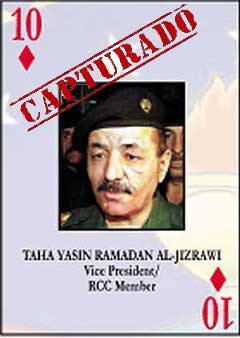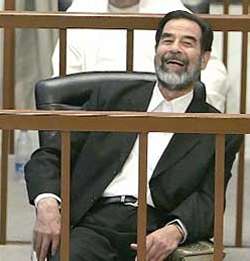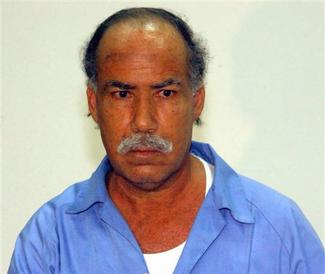Ambassador Khalilzad and General Casey Discuss New Security Plan:
At a press conference January 15, US Ambassador Zalmay Khalilzad and Multi-National Forces-Iraq Commander General George Casey discussed the new Baghdad Security Plan, which is based on the assumption that increased security for Baghdad is key to allowing political progress and for securing the rest of the country.
The plan is designed, structured, and led by the Iraqis with US support. Prime Minister Maliki and the Government of Iraq (GOI) have committed that all those who break the law will be targeted; there will be no sanctuary for criminals or murderers; no militia will be a replacement for the state or control local security; and military commanders will have freedom of action and an ability to do what is needed without political interference or micromanagement.
Plan Incorporates Economic, Political, and Reconstruction Efforts to Assist with Security:
An essential part of the plan is for Iraq to improve its ability to meet the needs of its people. To facilitate this, the Iraqis are planning political, economic services, and public affairs programs with senior Iraqi leaders in charge of each. Additionally, the GOI will also spend $10 billion on infrastructure and reconstruction projects, creating jobs for the Iraqi people.
Working jointly with the GOI, the US will double the number of Provincial Reconstruction Teams in Iraq to support the provincial and local governments, helping communities with reconciliation efforts and accelerating the transition to Iraqi self-reliance.
Political Progress Necessary for Security Plans Success:
Political progress is also critical to the success of the new security plan. As such, the GOI has committed to holding provincial elections, reforming de-Ba'athification laws, passing hydrocarbon legislation, sharing oil revenues among all Iraqis, and considering constitutional amendments.
Regional Efforts to Improve Security:
The new plan also reinforces regional efforts to stabilize Iraq, and it is integrated into a broader regional strategy, encouraging more Arab states to play a positive role and supporting Iraqi efforts to engage their neighbors.
The regional aspect of the plan also seeks to change the behavior of Iran and Syria, going after their networks in Iraq that are attacking Coalition Forces and undermining Iraqi security. For example, the Coalition and GOI have already taken steps against Iranian Explosively Formed Penetrator/Improvised Explosive Device networks associated with the Iranian Quds forces.
Iraqi Police Net 301 New Recruits in Fallujah and Habbiniyah:
In recruiting drives held January 10, the Fallujah Police District enlisted 102 Iraqi males, and the Habbaniyah Police District enlisted 199. The 301 recruits will soon travel to Jordan to attend the International Police Training College, where they will be joined by 550 recruits from other parts of Anbar province.
There are currently over 1,900 Iraqi Police candidates in training in Jordan who are scheduled to return to Anbar province for duty in January and February.
1st IA Division Assumes Control of 2nd Brigade:
The 1st Iraqi Army (IA) Division assumed tactical command of the 2nd Brigade from US Marine Regimental Combat Team 5 (RCT-5) in a ceremony in Fallujah January 9. The brigade has operated under the direction of RCT-5 for the last year in Fallujah proper and will continue its informal partnership with the regiments 1st Battalion, 24th Marines.
Iraqi Leadership Declares Support for Bush Plan:
Iraqs Deputy Prime Minister, Barham Salih (Kurdish Alliance), said that Iraqi leaders must commit to reforms. He stated that the time has come to take initiative, and utilize American support that has been offered to us to really turn the corner. Salih added that failure to do so would damage Iraqi leaders credibility in the eyes of Iraqis.
Commenting on the new security plan, Khaled al-Attiya (UIA), a deputy speaker of parliament, said If we want the Iraq that we longed for and worked for, then those political forces which suffered under the former regime ... must get together and make this work.
Vice President Hashimi Attacks Maliki for Shia Militia Ties: Ahhhh, politics!
Vice President Tariq al-Hashimi, Iraqs most senior Sunni Arab politician, launched a bitter personal attack on Prime Minister Maliki, warning him that the Iraqi government had only limited time to break with sectarian groups and start delivering to ordinary citizens.
Hashimi stated that Maliki must serve all Iraqis, rather than maintain his affiliation with Shia cleric Muqtada al-Sadr. He argued that Maliki had to be encouraged to break away from Sadr and unite with other groups in Iraqi society, such as the Sunnis and the Kurds.
SCIRIs Hakim Calls on GOI to Curb Militia Violence:
Abdul Aziz al-Hakim (SCIRI) publicly stated that the Government of Iraq should strike with an iron fist against anyone who endangers the safety of people. He also urged the militia of cleric Muqtada al-Sadr to disarm. Hakim commented just hours after President Bush announced his new strategy in Iraq.
Page 19 shows the Government has lowered the oil production goal from 2.5 million barrels per day to 2.1 mbpd. They produced about 2.1 through November and December. Perhaps this reflects the softening price of crude? Or some big producer is down for maintenance? No explanation is offered in the report. Refined product supplies are up.
Two Saddam Aides Hanged at Dawn:
The sentences against the former head of Iraqi Intelligence and the judge of the Revolutionary Court that ordered the execution of 148 citizens of Dujail in 1982 were carried out at dawn January 15. Barzan Ibrahim al-Tikriti, Saddam's halfbrother and Awad al-Bandar, former judge on Saddams Revolutionary Court, were hanged for their roles in the Dujail killings.
Barzan was a feared figure in Iraq at the head of the intelligence service in the 1980s. Bandar presided the Revolutionary Court which sentenced 148 Shiite men and youths to death after an assassination attempt on Saddam in the town of Dujail in 1982. Along with Saddam, they were convicted November 5 of crimes against humanity by the US-sponsored High Tribunal.
More than 13 hours after the carrying out of the sentences against two of Saddam Hussein's aides, Barzan Ibrahim al-Tikriti and Awad Hamad al-Bandar, an official video was played to a small group of Iraqi and Western reporters that showed the noose decapitating Tikriti. Officials said they would only run the silent, three-minute video once and not show it in public again. Once was enough.
In order to avoid the distribution of any illicit videos such as the ones released after the execution of Saddam Hussein reporters attending the showing had their mobile phones taken by Iraqi security men.
Saudi Arabia to Host Next Arab League Summit:
Saudi Arabia's ambassador to the Arab League announced January 16 that Riyadh will host the organization's next summit March 28 and 29 in a bid to heal ethnic divisions in the region. The 22-member Arab League traditionally holds its annual summit in March in different Arab capitals.
Iraqi President Talabani Arrives in Syria:
President Talabani became the first Iraqi head of state to visit Syria in nearly three decades when he arrived in Syria January 14 with a high-ranking delegation including interior, trade and water ministers and the chief of the State Oil Marketing Organization. Good. Let the Iraqis negotiate with the Syrians, not the Congress.
|
 An Iraqi court sentenced Saddam Hussein's cousin "Chemical Ali" to death on Tuesday for crushing a Shiite revolt after the 1991 Gulf War.
An Iraqi court sentenced Saddam Hussein's cousin "Chemical Ali" to death on Tuesday for crushing a Shiite revolt after the 1991 Gulf War. 
 Taha Yassin Ramadan, Iraq's former vice president, will be hanged on Tuesday for crimes against humanity, Iraqi legal sources have said. The Iraqi governement was reported on Monday to have requested that US officials hand over Ramadan into Iraqi custody ahead of his execution.
Taha Yassin Ramadan, Iraq's former vice president, will be hanged on Tuesday for crimes against humanity, Iraqi legal sources have said. The Iraqi governement was reported on Monday to have requested that US officials hand over Ramadan into Iraqi custody ahead of his execution.
 IRAQ is bracing itself for another surge of violence tomorrow, when Saddam Hussein is expected to be sentenced to death for crimes against humanity. Iraqs national security adviser, Mowaffak al-Rubaie, told The Times that the central provinces of Baghdad, Diyala and Salahaddin would be placed under curfew. There are more security measures under consideration, he added.
IRAQ is bracing itself for another surge of violence tomorrow, when Saddam Hussein is expected to be sentenced to death for crimes against humanity. Iraqs national security adviser, Mowaffak al-Rubaie, told The Times that the central provinces of Baghdad, Diyala and Salahaddin would be placed under curfew. There are more security measures under consideration, he added.  A lawyer for Saddam Hussein and a Jordanian newspaper said on Monday that the former ruler's half brother rejected a purported US offer of a ranking Iraqi government position in exchange for testimony against the deposed leader.
A lawyer for Saddam Hussein and a Jordanian newspaper said on Monday that the former ruler's half brother rejected a purported US offer of a ranking Iraqi government position in exchange for testimony against the deposed leader.  A co-defendant in the trial of Saddam Hussein complained on Wednesday about the quality of cigarettes the U.S. military gave him while in custody.
A co-defendant in the trial of Saddam Hussein complained on Wednesday about the quality of cigarettes the U.S. military gave him while in custody. In a letter smuggled from prison and published by Asharq al Awsat,
In a letter smuggled from prison and published by Asharq al Awsat,